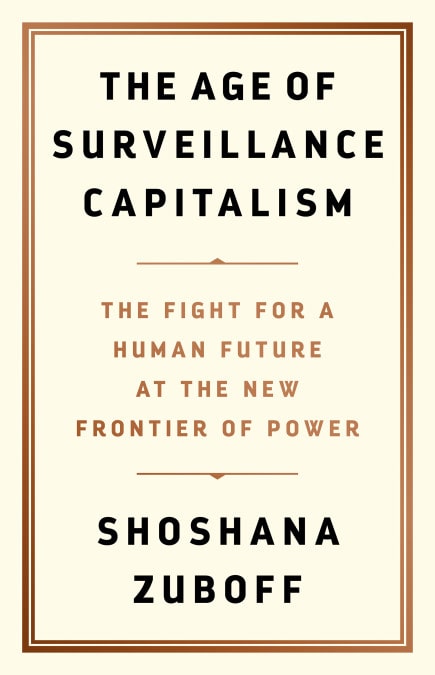By Sam DiBella, London School of Economics
Early last year, Shoshana Zuboff’s The Age of Surveillance Capitalism arrived to herald the new form of economic oppression we have watched creep into our lives. Zuboff, a professor emerita from Harvard Business School known for her research on information technology in the workplace, set a monumental task for herself—to develop a constellation of vocabulary that encircles the boundless hype of modern technology companies. Ultimately, I was disappointed by her approach, but she has drawn on such a complicated framework that I should explain it first before I say more.
To start, Zuboff walks us through the recent history of US tech companies—the dotcom bust that traumatised the industry; the success of Apple and its electronics sold on the conceit of consumer choice; and the surveillance-favourable environment created by the US National Security Agency (NSA) and CIA’s investments in the ‘war on terror’. All these factors, Zuboff argues, steered us away from both an egalitarian information workplace and the libertarian dream of a cyberspace frontier. Pressured by ravenous venture capitalists, start-up founders like Mark Zuckerberg and Larry Page created surveillance capitalism instead.
Unlike industrial capitalism, which profits from exploiting natural resources and labour, surveillance capitalism profits from the capture, rendering and analysis of behavioural data through ‘instrumentarian’ methods that are designed to cultivate ‘radical indifference […] a form of observation without witness’ (379). The surveillance capitalists found an untapped reservoir of information that their services were collecting for internal analytics and programming, and they saw an opportunity: they could sell that ‘data exhaust’ to advertisers. For them, the humans attached to that data are just accessories.

In her writing, Zuboff often compares the instrumentarianism of surveillance capitalism to the totalitarianism that Hannah Arendt describes in The Origins of Totalitarianism. Zuboff draws links between the charting of cyberspace by surveillance capitalists and Arendt’s analysis of British imperialism as a forerunner of totalitarianism. Ultimately, she denies their equivalence, since totalitarianism arises in a state, whereas instrumentarianism arises in companies. (Though, with all the public–private partnerships going on, I’m not sure that they’re so easily separated.) As a result, Zuboff is more concerned with surveillance by corporations than government surveillance. Her critique of surveillance companies is often to the extent that they begin to resemble a tyrannical, authoritarian state.
Zuboff sees the resulting economic structures as completely unprecedented—a rogue capitalism. Where before companies relied on the original sin of ‘primitive accumulation’, surveillance companies like Facebook and Google rely on the continual process of ‘digital dispossession’ (a concept Zuboff has expanded from David Harvey). We are each continually rendered understandable and profitable for these companies. More than government surveillance designed to quash free will, Zuboff worries that surveillance companies will harness human free will as a means to their ends. They are indifferent to us, yet dependent on the monotony of guaranteed outcomes that we can provide.
Zuboff describes the full cycle of that exploitation, which starts with a company’s ‘incursion’ into an unexploited domain of behaviour, continues with the ‘habituation’ of users to that incursion and finishes with the ‘adaption’ and ‘redirection’ of any attempts at critique or reform. (The coerced data that built Google Street View is the paradigmatic example.) To that purpose, surveillance companies use a rhetoric of exceptionalism to mask our dispossession. They wash their works with the semblance of ethics and accountability to avoid meaningful reform. They put ‘nudges’ in choice architecture, like surveillance-friendly default settings, to take advantage of the limited time and attention of users. They also take advantage of their corporate standing to dabble in human experimentation and political influence, without abiding by the standard research ethics of consent from, and cooperation with, research participants. The list is long and grows ever longer.
Zuboff argues that companies like Facebook and Google are able to do all this because they have monopolised how they are viewed (here, Zuboff borrows from Émile Durkheim’s work on the division of knowledge production and specialisation). Their work is hidden in proprietary closed-source code; they use non-disclosure agreements and vertical organisation to obfuscate their practices. They poach academics from universities. The CEOs of major surveillance companies often have near-controlling levels of shares, which allows them to direct their companies as they wish. The resulting divisions make it hard for anyone other than surveillance capitalists to make authoritative pronouncements about what exactly they do.
This is all, for Zuboff, a worrying arsenal arrayed against the quintessential project of contemporary liberalism—the individual. She sees surveillance capitalism as an extension of the psychological research of B.F. Skinner: his theory of ‘behaviourism’ counted people as reducible to their behaviours and reflexes. Skinner aimed to improve social cohesion and workplace efficiency, regardless of individual will. Zuboff outlines episodes that exemplify surveillance capitalism’s affinity for behaviourism, like the development of biometrics and Rosalind Picard’s research into affective computing for autistic users being subsequently co-opted by surveillance start-ups. All this goes to show that surveillance capitalism is inexorably working to weaken our sacrosanct right to personal autonomy.
While Zuboff criticises behaviourism and surveillance capitalism for suppressing our sovereignty of self, her goal is also to imagine a valiant, collective resistance to surveillance capitalism. So how does the sovereign self work in a collective process? It’s hard to see how democratic process, where we all abide by the will of others to some degree, would avoid many of the individualistic critiques that Zuboff makes of surveillance capitalism. We don’t hear much on this from Zuboff, and similar subtle contradictions ultimately dilute much of her messaging. She claims that surveillance capitalism is unprecedented and incomparable to ideologies like totalitarianism and behaviourism, but makes frequent analogies to both. She’s against determinism and ‘inevitabilism’, yet her theory of history is directed by descriptions of ideology (Evgeny Morozov explains her historical approach well in his review.)
Early on, Zuboff carefully describes surveillance capitalism as a capitalism, rather than an offshoot of the capitalism. With that phrasing, she positions surveillance capitalism as having concrete predecessors and as being totally unprecedented, an overextension of capitalism. She argues against a Marxist critique of capitalism as an entire economic system, because she believes Marxism uses an economic determinism that she’d rather avoid (which she juxtaposes to the technological determinism of surveillance capitalists). But, even if you’re not an anti-capitalist, this introduces a fissure in Zuboff’s theoretical edifice.
When we look at it, are surveillance capitalists really so different than what Marxist theory would describe? Marxist economics defines capitalism by its ability to consume more and broader areas of human life. Companies have been manipulating human behaviour with innovations like company towns, company scripts and union-busting for centuries, and the service economy has forced workers to wear a smile for decades. That surveillance capitalists hide their exploitation under a rosy veil is not new either. Muckraking journalists like Frances Kellor and Upton Sinclair had to uncover the horrible working conditions of industrial capitalism, hidden as they were under the ‘scientific management’ of Taylorism and Fordism. Zuboff does touch on these topics, but they also make her claims to surprise feel out of place. Capitalists who systematically lied to make a profit are already littered all over US business history and ignoring them is an odd omission.
Furthermore, The Age of Surveillance Capitalism is a very long book. Like The Odyssey, it’s full of epic similes to ground the text—sharks, wizards, tapeworms. They are not subtle, and I found their length and frequency to only obfuscate Zuboff’s urgent message. The complicated interweaving of narrative, memoir and academic description is also not structured in a friendly manner for the reader. Pared-down prose would have done a lot to improve The Age of Surveillance Capitalism.
So, who is this book for? It’s tempting to compare it to magnum opera like Thomas Piketty’s Capital in the Twenty-First Century or Hannah Arendt’s The Origins of Totalitarianism that appeal to the curious as well as the academic. But, for me, The Age of Surveillance Capitalism doesn’t make the bar. Two of Surveillance & Society’s recent triptych of reviews of The Age of Surveillance Capitalism critique its representation of legal constructs and its centring in the Global North, although they still find it a useful reference. I do see people specifically curious about how a liberal politic analyses this new form of exploitation or who are mostly unfamiliar with modern surveillance as benefiting the most from The Age of Surveillance Capitalism. For academics, it may be a convenient way to refer to the societal problem of surveillance, but not, perhaps, as a foundational source material. As Kirstie Ball notes in Surveillance & Society’s third review: ‘this book was not written for us. It is intended as a wake-up call for the educated business reader to recognize the massive power of the tech platforms’. With that in mind, Zuboff’s framing of surveillance capitalism as a rogue capitalism suddenly makes sense—the book is proof of the knots that a writer has to tie themselves in to ask capitalists to critique capital.
As for the grander goal of overthrowing surveillance capitalism, while Zuboff accurately describes its horrors, her writing lacks a convincing account of collective action and organisation to counter it. There have been so many hopeful lessons recently, like the workers whose walkouts stopped Google collaboration with the US military or the recent San Francisco local ordnance that outlawed facial recognition software. Other than a short section on artistic projects that obfuscate data and a legal case in Spain, those lessons are missing from The Age of Surveillance Capitalism.
I worry that I have seemed uncharitable throughout this review. I truly started reading The Age of Surveillance Capitalism with enthusiasm; I attended a talk held by Shoshana Zuboff at the MayDay Rooms in London earlier last year, and she is an engaging and charismatic speaker. But as I read, I grew dismayed by her research’s translation to the page. Make no mistake, the dangers of surveillance capitalism are real and coherent, and I’m glad for the attention that The Age of Surveillance Capitalism has given to systematic corporate surveillance. With cautionary books like this, however, there’s a fine line between praxis and paralysis (as we’ve seen in debates over how to cover the climate crisis). I fear that for many The Age of Surveillance Capitalism will serve the latter. It’s a decent history, but a bad call to arms.
Sam DiBella is an MSc candidate in Media and Communications at LSE. His dissertation research is on online deanonymisation and lateral surveillance.
Note: The views expressed in this article are the author/s, and not the position of Intellectual Dose, or iDose (its online publication). This article is republished from The LSE Review of Books under a Creative Commons license.




